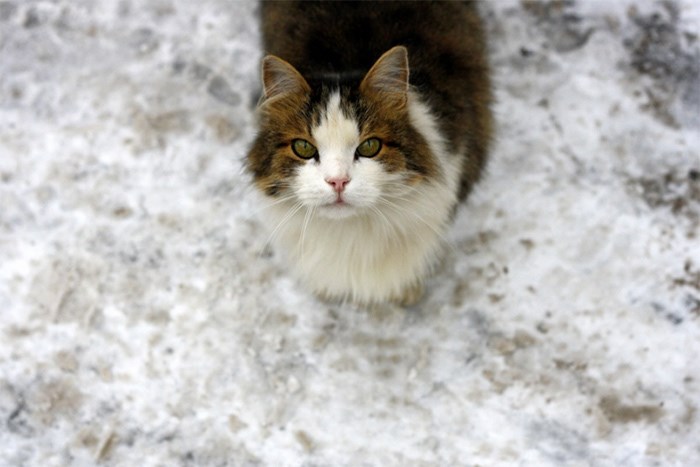 Sand and salt used to make walking and driving after for humans can pose dangers for pets
Sand and salt used to make walking and driving after for humans can pose dangers for pets
With the recent blast of winter weather hitting the Lower Mainland, the BC SPCA is reminding pet owners to take extra care of furry family members during the colder months of the year.
The salt and sand spread on roads and sidewalks to make driving and walking safer for humans can be potentially dangerous to pets.
“When your dog is walking in it, those materials could get between his paw pads or his toes, and you don’t want him to lick or ingest any of that,” BC SPCA manager of animal welfare Kim Monteith said in an email.
According to Dr. Emilia Gordon, the BC SPCA’s senior manager of animal health, salt and ice removal products can irritate the mouth, paws and skin. It can cause stomach upset and electrolyte imbalances if ingested.
“Don’t allow dogs to lick snow, ice, or puddles from areas where road or sidewalk salt has been applied,” she said.
“Don’t forget to both dry your pet’s paw pads after being outside as well as clean between his toes and pads,” Monteith added.
There are pet-friendly, non-corrosive de-icing compounds readily available in stores.
Additionally, the SPCA recommends using pet-safe propylene-based antifreeze in vehicles. Traditional antifreeze with ethylene glycol is highly toxic to pets and wildlife, ingesting as little as a teaspoon can cause kidney failure in a cat and a tablespoon is enough to kill a cat or small dog. Gordon said ethylene glycol tastes sweet and while manufacturers have been required to add bittering agents since 2011, but effectiveness is variable.
The animal protection agency also recommends all drivers, whether or not they have pets, to think and thump before starting the car. During cold whether cats and wildlife often gravitate to warm vehicle engines and banging the hood of the car can alert an animal and help avoid a tragic ending for an animal seeking refuge from the cold, Monteith said.
“It just takes two seconds — as the weather gets colder, animals look for warmth wherever they can find it,” she adds. “It’s one, simple act, and it’s a great idea to make ‘think and thump’ a habit every morning when it’s cold outside.”
Even though pets might come with a built-in fur coat, cold weather conditions can pose a serious risk, Monteith notes.
“Extra caution should be taken to ensure that your pets stay warm, safe and healthy.”


